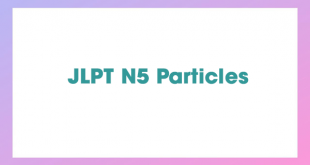Japanese particles : A quick overview of Japanese particles.
| Particle | Uses | Example |
| で | Indicates
1. where an action takes place (at, in) 2. method or tool used for an action (with, by) 3. the composition of an object (of, from) |
学校(がっこう)で勉強(べんきょう)します。
I study at school. 飛行機(ひこうき)でロンドンに行きました。 I went to London by plane. バターはミルクで作(つく)ります。 Butter is made from milk. |
| へ | Indicates
1. the direction of the action (to) 2. the destination or goal of the action (at) 3. the person or thing to which an action is directed (to, for) |
学校(がっこう)へ行(い)きます。
I go to school. 空港(くうこう)へ着(つ)きました。 I arrived at the airport. これはあなたへのプレゼントです。 This is a present for you. |
| に | Indicates
1. the direction of the action (to) 2. existence (in, at, on) 3. change of state (turn into) 4. time (on, in, at) 5. purpose of action (in order to) |
学校(がっこう)に行(い)きます。
I go to school. 机(つくえ)の上(うえ)に本があります。 There is a book on the desk. 信号(しんごう)が青(あお)になりました。 The traffic light has turned green. 学校(がっこう)は毎日八時半(まいにちはちじはん)に始(はじ)まります。 School starts at 8.30 every morning. 私はレストランへおすしを食べに行きました。 I went to a restaurant to eat sushi. |
| の | 1. Indicates possession (’s)
2. Indicates location (of) 3. joins two nouns, the first noun describes the second noun 4. transforms colours into adjectives |
お父さんの本です。
My father’s book. テーブルの上(うえ)です。 It is on top of the table. これは日本語の教科書(きょうかしょ)です。 This is a Japanese textbook. あれは緑(みどり)の車(くるま)です。 That is a green car. |
| を | 1. joins a noun and a verb (indicates the direct object of the verb)
2. I want to ~ 3. indicates an occupation (I am a ~) |
私はスキーをします。
I ski. コーラを飲みたいです。 I want to drink coke. 父は先生をしています。 My father is a teacher. |
| は | Indicates
1. a topic in an affirmative sentence 2. a topic in a negative sentence 3. contrast
|
この本は難しい。
This book is difficult. ボールペンはありません。 There is no ball-point pen. これは私の、それはあなたの。 This is mine. That is yours. |
| が | Indicates
1. existence 2. a question (put after a question word) 3. desire, need and ability 4. feelings, opinions, and describing one of the five senses 5. but 6. makes an introductory clause before the main point
|
人がいます。
There is a person. 何時がいいですか? What time is good for you? 私は英語(えいご)が話(はな)せます。 I can speak English. 部屋(へや)が暑(あつ)いです。 The room is hot. 昨日電話(きのうでんわ)しましましたが、お留守(るす)でした。 I called yesterday, but you weren’t home. |
.
Complete these sentences with the correct particles:
- いつ日本(にほん)___帰りますか。
- いいにおい___する。
- 私(わたし)___後(うし)ろ___あります。
- 私(わたし)___海(うみ)___泳(およ)ぎました。
- 私(わたし)は学校(がっこう)___自転車(じてんしゃ)___通(かよ)っています。
- 俊夫君(としおくん)、友達(ともだち)が遊(あそ)び___来(き)ましたよ。
- これはプラスチック___できた箱(はこ)です。
- これは母(はは)___のプレゼントです。
- 道(みち)___雪(ゆき)がたくさん残(のこ)っています。
- 僕(ぼく)はお父さん___手紙(てがみ)___書(か)いた。
- もう秋(あき)___なりましたね。
- これは私___本です。
- この紫(むらさき)___花(はな)___なんといいますか?
- あそこ___山(やま)___見(み)えます。
- コーヒー___飲(の)みましょう。
- あなたはどんな食べ物___好きですか?
- 気分(きぶん)___いい。
- 私はアイスクリーム___食べたい。
Answers
- へ
- が
- の、に
- は、で
- へ、で
- に
- で
- へ
- に
- に、を
- に
- の
- の、は
- に、が
- を
- が
- が
- を
 Nihongo Nihongo
Nihongo Nihongo


